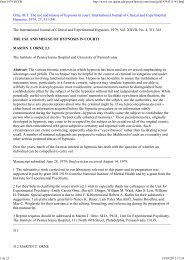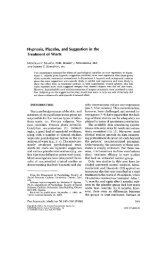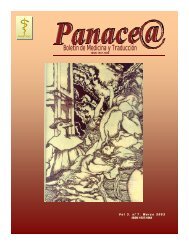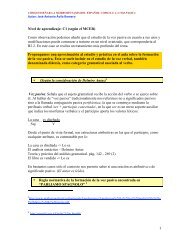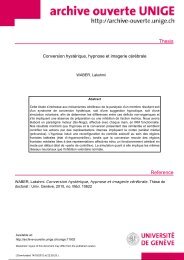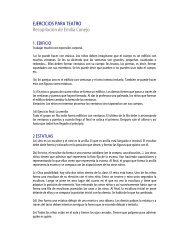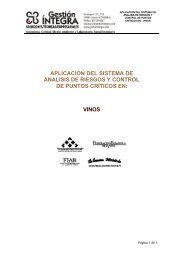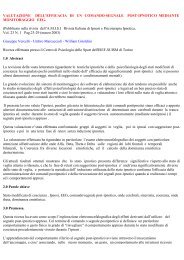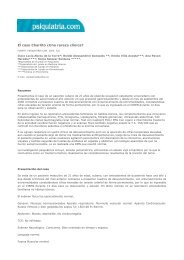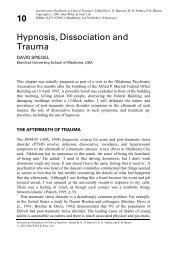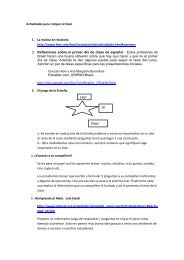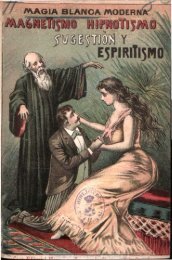Diccionario etimológico comparado de la lengua castellana
Diccionario etimológico comparado de la lengua castellana
Diccionario etimológico comparado de la lengua castellana
Create successful ePaper yourself
Turn your PDF publications into a flip-book with our unique Google optimized e-Paper software.
2574 PEBRE FEBRI<br />
ga<strong>de</strong>ro: el que busca forraje ó pasto.<br />
Cfr. HERBAJE, HERBARIO, etC.<br />
SIGN.— CACERA.<br />
Febrer-illo. m.<br />
(]fr. etim. febrero. Suf. -tilo.<br />
SJGN.— d. <strong>de</strong> FEBRERO. Ú. sólo en <strong>la</strong> loe.<br />
FEBRERiLLO EL LOGO, para <strong>de</strong>notar <strong>la</strong> inconstancia<br />
<strong>de</strong>l tiempo en él, y en el ref. febreri-<br />
LLO CORTO, CON SUS DÍAS VEINTIOCHO.<br />
Fe-br-ero. m.<br />
ETIM.— Del <strong>la</strong>t. fe-bru-arius, -arii, el<br />
mes <strong>de</strong> febrero; <strong>de</strong>riv. <strong>de</strong> /e-bru-us, -a,<br />
-um=fe-bru-Us=fe-bru-aLis^ epíteto que<br />
los romanos daban á <strong>la</strong> diosa Juno, á<br />
quien se hacían los sacrificios en el mes<br />
<strong>de</strong> febrero; <strong>de</strong> don<strong>de</strong> fe-bru-um, plur.<br />
fe-bru-a, sacrificios expiatorios. Derívase<br />
fe-bru-um, <strong>de</strong> <strong>la</strong> raíz bhar=bhur<br />
= rhru-, hervir, cocer, cocer cerveza,<br />
hacer hervir; hinchar, inf<strong>la</strong>r; on<strong>de</strong>ar,<br />
fluctuar, agitarse al modo <strong>de</strong> <strong>la</strong>s ondas;<br />
ar<strong>de</strong>r, echar l<strong>la</strong>ma; lucir, relucir, relumbrar,<br />
resp<strong>la</strong>n<strong>de</strong>cer, etc.; por duplicación<br />
(bha (<br />
r ) + BHRU =fe-bru-) .<br />
fe-bru-urn, significa purificado por el<br />
fuego, por los sacrificios, y fe-bre-ro,<br />
el mes <strong>de</strong> los sacrificios expiatorios.<br />
De fe-bru-us, fe-bru-um se <strong>de</strong>riva febru-are^<br />
expiar, limpiar, purificar por<br />
medio <strong>de</strong> sacrificios (Februare, id est<br />
pura /acere. Varr. ap. Nov. p. 114.22.<br />
Id vero quod purgatur, dicitur februatum.<br />
Paul. D. p. 85). Cfr. skt. HJ U¿i ,<br />
Etimológ.<br />
bhur-an'ya, ser furioso, activo, ligero;<br />
grg. 'fúp-tó, mezc<strong>la</strong>r; :rop-'fúp-a), agitarse,<br />
on<strong>de</strong>ar como el mar; teñirse <strong>de</strong> púrpura,<br />
bril<strong>la</strong>r como <strong>la</strong> púrpura; xop-3i¿p-a=<strong>la</strong>t.<br />
pur-pw^-a, prim. <strong>de</strong>l esp. púr-pur-a; <strong>la</strong>t.<br />
fur-ere, ser furioso, arrebatado; /wr-m,<br />
peste, ca<strong>la</strong>midad, azote; furi-ae, -arum,<br />
<strong>la</strong>s furias, diosas vengadoras <strong>de</strong> los<br />
<strong>de</strong>litos, furor, <strong>de</strong>lirio; prim. <strong>de</strong> furia<br />
(cfr.); fur-i-osus, -osa, -osum, prim. <strong>de</strong><br />
furioso; fur-or, -or-is, -or-em, prim. <strong>de</strong><br />
FVR-OR ; /u-sc-u-s {=/ur-scus), -a, -wm,<br />
oscuro, tostado, moreno; prim. <strong>de</strong> fusco,<br />
FOSCO, hosco; fu-sc-are, ennegrecer, poner<br />
tostada una cosa; ob-fu-sc-are, <strong>de</strong>slumhrar,<br />
obscurecer, prim. <strong>de</strong> o-fuscar<br />
(cfr.); <strong>de</strong>-fru-tu-m, vino cocido; /érf-e/*e,<br />
hervir, bullir, cocer; prim. <strong>de</strong> ferv-ir<br />
y herv-ir; ferv-or, -oris, -orem, calor,<br />
vehemencia; prim. <strong>de</strong> ferv-or; ferv-idu-s,<br />
-da, -dum, primitivo <strong>de</strong> férvido;<br />
ferü-ens, -ení-is, -ent-em, (part. pres.),<br />
prim. <strong>de</strong> FERVIENTE, ferc-esc-ere, (incoa-<br />
tivo), empezar á hervir (cfr, suf. -escer<br />
= ecer); <strong>de</strong> don<strong>de</strong> e/-fero-escere, prim. <strong>de</strong><br />
ef-fero-escens, -ent-is, -ent-em, <strong>de</strong> don<strong>de</strong><br />
<strong>de</strong>scien<strong>de</strong> efervescente (cfr.); fer-mentu-m,<br />
-ti, levadura; acción <strong>de</strong> esponjarse<br />
<strong>la</strong> tierra; <strong>la</strong> cerveza; ira,<br />
prim. <strong>de</strong> fer-mento (cfr.<br />
cólera, enojo;<br />
suf. mento=<br />
miento) y <strong>de</strong> fer-men-t-a-re, <strong>de</strong> don<strong>de</strong><br />
<strong>de</strong>scien<strong>de</strong> fermentar (=hervir, bullir);<br />
fru-tex, -tic-is, tic-em, arbusto, arbolillo;<br />
fru-tic-osus, -osa, -osum, primitivo <strong>de</strong><br />
FRUTic-oso; fron-s, front-is, front-em<br />
(z=fi^v-ont=fru-ont = bhru-vant-J, prim<br />
<strong>de</strong> FRONTE (ant.) y frente (elevado,<br />
bril<strong>la</strong>nte, que luce); <strong>de</strong> don<strong>de</strong> front-al,<br />
frontal-era, frontal-ero, frontalete;<br />
frontero, frontera, etc.; fi-b-er,<br />
-eri, primitivo <strong>de</strong> bíbaro. Cfr. inglés<br />
ferment, fervent; brew, cocer, hervir;<br />
hol. brouwen; ant. al. al. pruwan; al.<br />
brauen; isl. brugga; sueco brygga; dan.<br />
brygge; anglo saj. beorma; ingl. barm;<br />
hol. berm; áueco bárma; dan. baerme;<br />
al. bcirme; ingl. bourn, burn; anglo-saj.<br />
burna, burne; hol. born; isl. brunnr;<br />
sueco brunn; dan. brónd; gót. brunna;<br />
ant. al. al. prunna; al. brunnen, fuente,<br />
pozo, etc. Correspon<strong>de</strong>n á febrero: ital.<br />
febbrajo; franc. ant. fervereth; mod. février;<br />
cat. fevrer; borg. feubrai; Ber.<br />
feuverier; feverier; port. fevereiro, fevreiro,<br />
etc. Cfr. febrerillo, hervi<strong>de</strong>ro,<br />
etc.<br />
SIGN.— Segundo mes <strong>de</strong>l año, que en los comunes<br />
tiene 28 días, y en los bisiestos 29 :<br />
Discrepando <strong>de</strong>l año so<strong>la</strong>r, según el cómputo <strong>de</strong> los<br />
Astrólogos, en solos tres días que venían á tomar <strong>de</strong><br />
nuestro mes <strong>de</strong> Febrero. Solis. H. N. Esp. 1. 3, cap. 17.<br />
Fr. y Rofr.—EN febrero, busca <strong>la</strong> sombra<br />
EL PERRO fr. fam. con que se da á enten<strong>de</strong>r<br />
que en el mes <strong>de</strong> febrero calienta ya el sol,<br />
—FEBRERO, CEBADERO, ref. que se dice para<br />
expresar qne <strong>la</strong> lluvia en este mes afianza <strong>la</strong><br />
cosecha <strong>de</strong> <strong>la</strong> cebada.<br />
Feb-ric-it-ante. adj.<br />
ETIM. — Del luí febrici-ta-ns, -antis,<br />
-ant-em, part. pres. <strong>de</strong>l verbo febricita-re,<br />
tener calentura; <strong>de</strong>riv. <strong>de</strong>l nombre<br />
/eb-ri-s, -is, calentura; cuya etim. cfr. en<br />
FIEBRE. De /eb-ri-s formóse primero<br />
febri-re, luego feb-r-icare y finalmente<br />
feb-r-ici-ta-re, y el incoat. feb-r-escere,<br />
empezar á tener calentura. De feb-ri-s<br />
se <strong>de</strong>rivan feb-ri-li-s, -le, primitivo <strong>de</strong><br />
febr-il y feb-ri-fug-us, -a, -um, (=que<br />
ahuyenta <strong>la</strong> fiebre, <strong>la</strong> pone en fuga),<br />
prim. <strong>de</strong> febrí-fug-o (cfr. -fug-o en<br />
fugar), etc. Cfr. febril.<br />
.<br />
i



